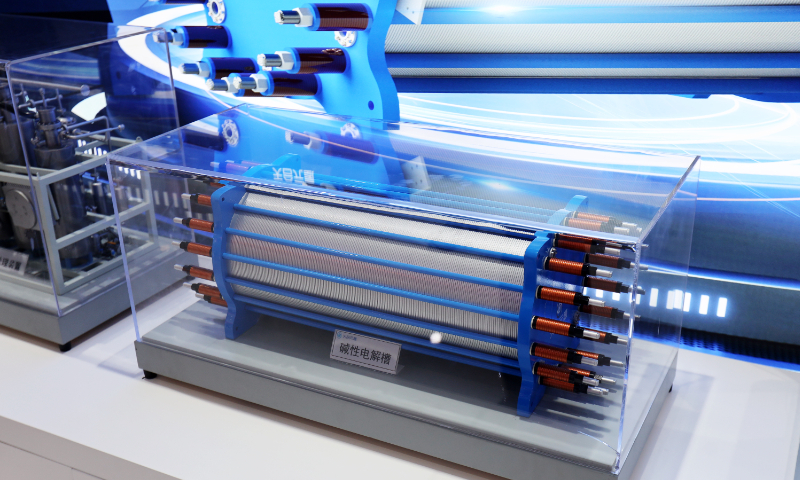
A hydrogen electrolyzer is on display at the International Photovoltaic Power Generation and Smart Energy Conference & Exhibition in Shanghai on June 13, 2024. Photo: VCG
The EU has implemented measures aimed at restricting Chinese products through new rules, investigations and potential tariff policies. Now, it has its sights set on Chinese hydrogen electrolyzers. Chinese experts on Saturday said that it is "a move of self-limitation" that will undermine Europe's green transition goals.
The EU will conduct a second phase auction valued at 1.2 billion euros ($1.34 billion) through its hydrogen bank from December 3, and winning projects will have to limit the sourcing of electrolyzer stacks from China to not more than 25 percent of total capacity, according to the European Commission's auction guideline published on Friday.
"Chinese production capacity is already more than 50 percent of global production… it is assessed that there is a significant risk of increased and irreversible dependency of the EU on imports of electrolyzers originating in China, which may threaten the EU's security of supply," reads the guideline.
"Europe is currently in a contradictory position. Economically speaking, using Chinese products or bringing Chinese industries into its energy transition plans would be the most cost-effective choice," Cui Hongjian, a professor at the Academy of Regional and Global Governance with Beijing Foreign Studies University, told the Global Times on Saturday.
However, with its focus on the so-called reducing dependence and de-risking policies, Europe has effectively imposed self-limitations, thus avoiding the most economically viable path, Cui said.
Electrolyzers are key devices that use electrical energy to split water molecules and generate hydrogen. They account for about 50 percent of the total cost of hydrogen production systems.
Hydrogen electrolyzers could potentially be China's fourth major new-energy export products, following batteries, photovoltaics and electric vehicles, according to media reports.
"The development of China's new-energy sector is a result of our strong technology, robust market and full-fledged industrial chains. China's exports of related products have contributed significantly to the global response to inflation and climate change," Mao Ning, a spokesperson of the Chinese Foreign Ministry, said at a routine press briefing on April 10.
"Protectionism does not solve one's own problems," Mao said.
Global Times




